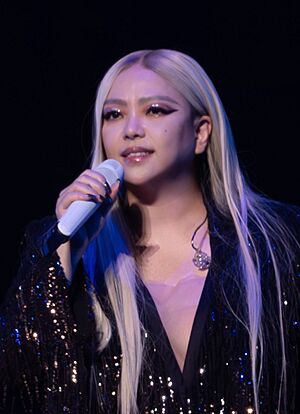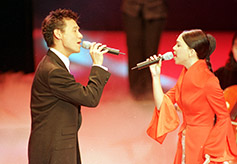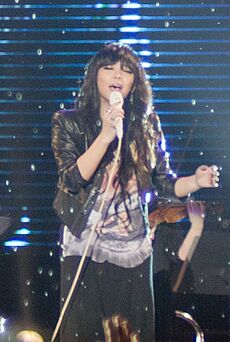A-Mei facts for kids
Quick facts for kids
A-Mei
|
|||||||||
|---|---|---|---|---|---|---|---|---|---|
| Kulilay Amit | |||||||||

A-Mei in 2024
|
|||||||||
| Born |
Kulilay Amit
9 August 1972 Beinan, Taitung, Taiwan
|
||||||||
| Nationality | Taiwanese | ||||||||
| Other names | Chang Hui-mei A-Mei Chang |
||||||||
| Alma mater | National Taitung Junior College | ||||||||
| Occupation |
|
||||||||
| Years active | 1996–present | ||||||||
| Agent | Mei Entertainment | ||||||||
|
Works
|
Discography | ||||||||
| Partner(s) | Sam Yao (2011–present) | ||||||||
| Family | Saya Chang (sister) | ||||||||
| Musical career | |||||||||
| Genres |
|
||||||||
| Instruments | Vocals | ||||||||
| Labels | EMI, Universal Music Taiwan | ||||||||
| Chinese name | |||||||||
| Traditional Chinese | 張惠妹 | ||||||||
| Simplified Chinese | 张惠妹 | ||||||||
|
|||||||||
| A-Mei | |||||||||
| Chinese | 阿妹 | ||||||||
|
|||||||||
Kulilay Amit (Chinese: 張惠妹; pinyin: Zhāng Huìmèi), known as A-Mei, is a famous singer and music producer from Taiwan. She was born on August 9, 1972, and is from the Puyuma group.
A-Mei started her music career in 1996. She quickly became a top star in Mandopop music. She is known for being a pioneer for Taiwanese indigenous peoples and for supporting gender equality and equal rights for all people. Many call her the "Queen of Mandopop" and the "Pride of Taiwan." Her long career and amazing talent have made her a pop culture icon in the Chinese-speaking world. She has sold over 50 million records, making her the best-selling female artist in Taiwanese music history.
Contents
- A-Mei's Early Life and Music Journey
- Growing Up in Taiwan (1972–1995)
- Becoming a Star (1996–1997)
- Concert Tours and More Success (1998–1999)
- Challenges and New Beginnings (2000–2003)
- Facing Challenges and Studying Abroad (2004–2005)
- Comeback and Continued Success (2006–2010)
- Global Recognition and Advocacy (2011–2013)
- New Music and World Tours (2014–2019)
- A-Mei's Music Albums
- A-Mei's Concert Tours
- Music Collaborations
- See also
A-Mei's Early Life and Music Journey
Growing Up in Taiwan (1972–1995)
A-Mei was born on August 9, 1972. Her birthplace was the Tamalakaw tribe in Beinan, Taitung, Taiwan. Her Puyuma name is Kulilay Amit. She was the seventh of nine children. Her family faced financial challenges when she was young.
Even without formal music lessons, A-Mei loved to sing and perform. She was exposed to tribal music early on. Her mother would record songs for her and her sisters. A-Mei was fascinated by the radio and music shows. She would even get other children to use flashlights to create "stage lighting" for her performances. Besides music, A-Mei was also good at sports. In elementary school, she earned a second-degree black belt in taekwondo.
In 1992, A-Mei moved to Taipei for work. She joined a TV singing contest after her father encouraged her. She reached the finals but did not win. Her father told her to try again. In 1993, she entered the contest once more and became the champion. Sadly, her father passed away before seeing her win. Years later, she sang "Disappear (掉了)" to remember him.
After her father's death, A-Mei found it hard to sing. But in 1995, she started singing in pubs with a rock band. A music producer named Chang Yu-sheng and a record label head, Chang Hsiao-yen, were impressed. A-Mei signed a music deal in March 1996.
Becoming a Star (1996–1997)
A-Mei first appeared on Chang Yu-sheng's album in July 1996. They sang a duet together. In November 1996, she sang a theme song for a radio station, which gained public attention.
On December 13, 1996, A-Mei released her first album, Sisters. Her mentor, Chang Yu-sheng, helped her create it. The record company worried her indigenous background might hurt sales. But A-Mei proudly shared her heritage. The album was a huge success. It was number one on the Taiwan IFPI chart for nine weeks. It sold 1.21 million copies in Taiwan and four million in Asia. The company was so surprised they forgot to nominate her for the 8th Golden Melody Awards.
Songs like "You Don't Want Anything" and "Released" became very popular. For the song "Sisters," Chang invited A-Mei's family to sing in the chorus. He also added Puyuma music elements. Sisters became the fourth best-selling album in Taiwan. It was also named one of the "200 Best Taiwanese Popular Music Albums."
On May 17, 1997, Billboard Magazine called A-Mei Asia's most popular singer. Her second album, Bad Boy, came out on June 7, 1997. Chang Yu-sheng was still very involved. Bad Boy was number one for nine weeks. It sold 1.38 million copies in Taiwan. This made it the best-selling album in Taiwan's music history. It sold over six million copies across Asia.
Bad Boy had many hit songs like "Can't Cry" and "Listen to the Sea." These songs are still loved today. The album earned A-Mei two Golden Melody Award nominations. Sadly, five months after the album's release, her manager Chang Yu-sheng passed away. A-Mei released a song called "Listen to You, Listen to Me" to honor him. In December 1997, she released another album, You Make Me Free Make Me Fly!, which was also a hit.
Concert Tours and More Success (1998–1999)
A-Mei started her first solo concert tour in January 1998. She performed in Taiwan, Hong Kong, and Singapore. Her first big concert on January 10, 1998, broke records. It was the fastest a Taiwanese singer had held a large concert after their debut. Tickets sold out very quickly.
In February 1998, Japan's NHK invited A-Mei to perform. She represented Taiwan at the "Asia Live Dream" event. Her fourth album, Holding Hands, was released on October 12, 1998. It included songs by her late mentor, Chang Yu-sheng. She also worked with singer-songwriter David Tao. The album sold over 1.1 million copies in Taiwan and four million in Asia. It earned her another Golden Melody Award nomination. She also won an award for her TV theme song "I Do Not Mind."
In January 1999, A-Mei became a spokesperson for Sprite. She sang "Give Me Feelings" for their commercials. By this time, she had won over 30 awards. Her total album sales were more than ten million. She won major awards in Hong Kong, becoming the only non-Hong Kong singer to do so.
Her EP, Feel, released on April 20, 1999, sold 180,000 copies. This made it Taiwan's best-selling mini-album. On June 8, 1999, her fifth album, Can I Hug You, Lover?, came out. It sold over 500,000 copies in its first week. It was number one on the IFPI chart for eleven weeks. It sold 1.18 million copies in Taiwan and over eight million in Asia. This made it A-Mei's highest-selling album in Asia.
A-Mei then went on her second Asia concert tour, Mei Li 99. She visited cities like Hong Kong, Singapore, Beijing, and Shanghai. She was the first Taiwanese singer to perform at the Shanghai Stadium. Nearly 80,000 people attended, making it a huge success. She also broke records in Beijing and Hong Kong for concert attendance. At the Taipei Municipal Stadium, she was the only female singer to fill the entire venue with 50,000 people. The tour had 14 concerts and attracted about 500,000 fans.

Her popularity was called the "A-Mei syndrome." She was the first Taiwanese artist on the cover of Asia Weekly. In September 1999, she sang a song to honor victims of the 921 earthquake. She donated her concert earnings to charity. In December 1999, she performed with Jacky Cheung at the 36th Golden Horse Awards. Her greatest hits album, A-Mei New Century Collection, released on December 28, 1999, also sold very well. It became Taiwan's best-selling album by a female artist in the 21st century.
Challenges and New Beginnings (2000–2003)
In January 2000, A-Mei sang a new Sprite commercial song. An American magazine called Details named her "China's Madonna." She was invited to the CCTV Spring Festival Gala, a big honor. On February 28, 2000, she was the first Taiwanese artist interviewed by CNN. CNN called her the "Asian Music Ambassador."
However, on May 20, 2000, A-Mei sang the National Anthem of the Republic of China at a presidential ceremony. This angered the government of the People's Republic of China. They stopped her from visiting mainland China until July 2001. Sprite also ended her contract. Chinese radio stations temporarily stopped playing her music. A-Mei clarified that she focuses on her music and wants "more peace and love."
On December 5, 2000, she released her seventh album, Regardless. It was her last album with Forward Music. It sold over 360,000 copies in Taiwan and over a million in Asia. It is one of Taiwan's best-selling albums in the 21st century.
In January 2001, A-Mei was on the cover of Newsweek, the only Taiwanese singer to do so. In June 2001, she joined Warner Music Taiwan. She sang the Mandarin theme song for the movie Pearl Harbor. In August, she performed at the 2001 Summer Universiade in Beijing. The crowd of 80,000 cheered loudly.
Her first album with Warner, Truth, came out on October 29, 2001. It sold over 200,000 copies in Taiwan and 1.6 million in Asia. Songs like "Remember" became very popular. She held a free concert in Taipei, attracting over 30,000 fans. In December 2001, A-Mei held seven concerts in the United States and Canada.
In 2002, A-Mei won her first Best Mandarin Female Singer award for Truth at the 13th Golden Melody Awards. She was also named one of the 25 Asian Heroes by Time Magazine. On August 30, 2002, she released her tenth album, Fever. It sold 180,000 copies in Taiwan and over two million in Asia. Fever earned her two Golden Melody Award nominations. She started her third concert tour, the A-Class Entertainment World Tour. She also won the MTV Asia Award for Favorite Artist Taiwan.
In 2003, during the SARS epidemic, A-Mei joined other musicians to record a charity song called "Hand in Hand." On June 27, 2003, her album Brave was released. She also starred in a movie called Brave and sang its theme song. The song "Brave" became a champion song in a vote for love songs. The album sold 170,000 copies in Taiwan and 1.6 million in Asia.
Facing Challenges and Studying Abroad (2004–2005)
In February 2004, A-Mei won the MTV Asia Award for Favorite Artist Taiwan again. In April, she received a World Peace Music Award for her focus on indigenous culture.
In June 2004, A-Mei faced a difficult situation. A concert in Hangzhou was canceled due to protests. Some students called her a "supporter of Taiwanese independence." This was because she had sung the national anthem at a presidential ceremony in Taiwan. Back home, some people questioned her patriotism. A-Mei stated she focuses on music and wants peace.
Despite these challenges, A-Mei held a benefit concert in Taipei in July 2004. This was for victims of Typhoon Mindulle. She also held a successful concert in Beijing.
Her album Maybe Tomorrow was released on September 21, 2004. A-Mei wrote two songs on this album. The album's sound was different from typical pop music. The music video for "Love Is The Only Way" showed a wedding between two men. This video was banned in mainland China. The album sold about 80,000 units in Taiwan, which was lower than her past albums.
Because of these setbacks, A-Mei decided to take a break. At the end of 2004, she went to Boston, Massachusetts, to study abroad for three months. This trip was for self-discovery. In 2004, she was also featured on the cover of the UK's NME magazine.
After returning to Taiwan in 2005, A-Mei participated in a public memorial. The Discovery Channel featured her as a Taiwanese icon. She also became a World Vision International ambassador and visited southern Sudan for charity. In October 2005, she became the first singer to perform at the Taipei Arena. In November 2005, her performance at the 42nd Golden Horse Awards was highly praised. This performance marked her return to the music scene.
Comeback and Continued Success (2006–2010)
On February 17, 2006, A-Mei released her album, I Want Happiness?. It was considered her comeback album. It sold 160,000 copies in Taiwan and over two million in Asia. Songs like "Hostage" became popular. The album earned her a Golden Melody Award nomination. She held a sold-out concert in Las Vegas in May 2006. In December 2006, she produced a musical called In Love with Carmen.
In April 2007, EMI Taiwan signed A-Mei to a new contract. It was worth NT$150 million, making her the highest-paid female singer in the region. On August 3, 2007, she released her album Star. It earned her three Golden Melody Award nominations. Star was number one on Taiwan's charts for four weeks. It sold over 130,000 copies in Taiwan and 1.7 million in Asia. She held a concert at Tamsui Fisherman's Wharf for 30,000 people. In September 2007, she performed at the Asia Song Festival in South Korea. She was also the first Taiwanese singer interviewed by Reuters. In October 2007, she was the "Rainbow Ambassador" for the Taiwan Pride parade. She showed support for her diverse fans and people living with certain health conditions. She started her fourth concert tour, the Star World Tour.
In February 2008, A-Mei filmed a music video for the 2008 Olympics theme song "Forever Friends." From March to May 2008, she performed in the opera Turandot in Japan. She performed 59 shows in major Japanese cities. When the 2008 Sichuan earthquake happened, she donated NT$5 million from her opera performances to help victims. At the 19th Golden Melody Awards, A-Mei performed in a new pop punk style.
The Star World Tour ended in March 2009. It had 20 performances in 13 cities, attracting 500,000 people. A-Mei was the first Chinese singer to perform five consecutive concerts at the Taipei Arena. On June 26, 2009, she released her album Amit. This was her first album under her aboriginal birth name. The album featured hard rock music and explored important social topics. It sold over 120,000 copies in Taiwan and 1.3 million across Asia. In September 2009, she was a spokesperson for the 2009 Summer Deaflympics in Taipei. She sang the theme song "Dreams You Can Hear." In November 2009, she started her fifth concert tour, Amit First Tour. In March 2010, she became a spokesperson for Coca-Cola. At the 21st Golden Melody Awards, Amit won six awards. This was a big win for A-Mei after eight years.
Global Recognition and Advocacy (2011–2013)
In January 2011, The Biography Channel (now FYI) made a special episode about A-Mei. It was shown in 23 countries to over 67 million viewers. She was the first Taiwanese singer to be featured. In March 2011, she renewed her contract with Coca-Cola Company. She even designed a special bottle.
On April 23, 2011, her album R U Watching Me? was released. It sold over 65,000 copies in Taiwan. The album earned her a Golden Melody Award nomination. In May 2011, CNN interviewed A-Mei again for their "Asian Celebrity Chat Room" TalkAsia. In June 2011, Forbes ranked her first in a survey of "The 25 Most Famous Taiwanese in Mainland China."
In September 2011, she started her sixth concert tour, the Ameizing World Tour. This tour celebrated her 15th anniversary. It had 59 shows in many countries. In London, she became the first Chinese-speaking female singer to hold a large concert at The O2 Arena. In July 2013, A-Mei became a judge on the Chinese talent show, The Voice of China (season 2). In December 2013, A-Mei held a free outdoor concert to support equal rights for marriage. She paid for the concert herself.
New Music and World Tours (2014–2019)
In January 2014, A-Mei was on the Asia Gay Equality Heroes list by Element Magazine in Singapore. In June 2014, she signed with EMI Taiwan. She was also chosen as the chief brand officer for the record label.
On July 2, 2014, she released her album Faces of Paranoia. It earned her Golden Melody Award nominations and she won Best Mandarin Female Singer. A concert in Taichung sold out quickly, attracting 30,000 people. In October 2014, she was on the cover of Singapore's Element Magazine, supporting equality.
In April 2015, she started her seventh concert tour, Utopia World Tour. Tickets for the Taipei shows sold out in minutes. The tour had 55 shows in many countries. On April 4, 2015, she released her album Amit 2. It earned her five Golden Melody Award nominations. In August 2015, she was a guest judge on The Voice of China (season 4). In December 2016, she started an upgraded version of her tour, Utopia 2.0 Carnival World Tour, to celebrate her 20th anniversary.
On January 15, 2017, tickets for her Kaohsiung Arena concerts sold out in minutes. The concerts brought in a lot of money and tourism. On December 12, 2017, she released her album Story Thief. It was a success, selling out its first batch of copies. Story Thief topped many music charts.
The Utopia World Tour ended on December 30, 2017. It set a record with 104 concerts. On May 16, 2018, Story Thief earned six nominations at the 29th Golden Melody Awards. Its music video for "Left Behind" won Best Music Video. It also won a Red Dot Design Award and a MAMA Award. On September 6, 2018, A-Mei sang with famous tenor Andrea Bocelli at a charity event in Italy. They sang in three languages. The song was included on Bocelli's album Sì. In December 2018, she won three awards at the Migu Music Awards for Story Thief. On December 31, 2018, A-Mei performed at Taipei City's New Year's Eve Festival. Her performance was highly praised. Story Thief was Taiwan's top-selling album by a female artist for two years in a row.
A-Mei's Music Albums
- Sisters (1996)
- Bad Boy (1997)
- You Make Me Free Make Me Fly! (1997)
- Holding Hands (1998)
- Can I Hug You, Lover? (1999)
- Regardless (2000)
- Journey (2001)
- Truth (2001)
- Fever (2002)
- Brave (2003)
- Maybe Tomorrow (2004)
- I Want Happiness? (2006)
- Star (2007)
- Amit (2009)
- R U Watching? (2011)
- Faces of Paranoia (2014)
- Amit 2 (2015)
- Story Thief (2017)
A-Mei's Concert Tours
- Sister Power World Tour (1998)
- Mei Li 99 World Tour (1999)
- A-Class Entertainment World Tour (2002–2006)
- Star World Tour (2007–2009)
- Amit First World Tour (2009–2010)
- Ameizing World Tour (2011–2013)
- Utopia World Tour (2015–2017)
- ASMR World Tour (2022–2025)
Music Collaborations
- "Shouldn't Be" (with Jay Chou) from Jay Chou's Bedtime Stories (2016)
- "Equivalence Relation" (with Li Ronghao) from Free Soul) (2022)
See also
 In Spanish: A-mei para niños
In Spanish: A-mei para niños
- List of best-selling albums in Taiwan
 | Frances Mary Albrier |
 | Whitney Young |
 | Muhammad Ali |





